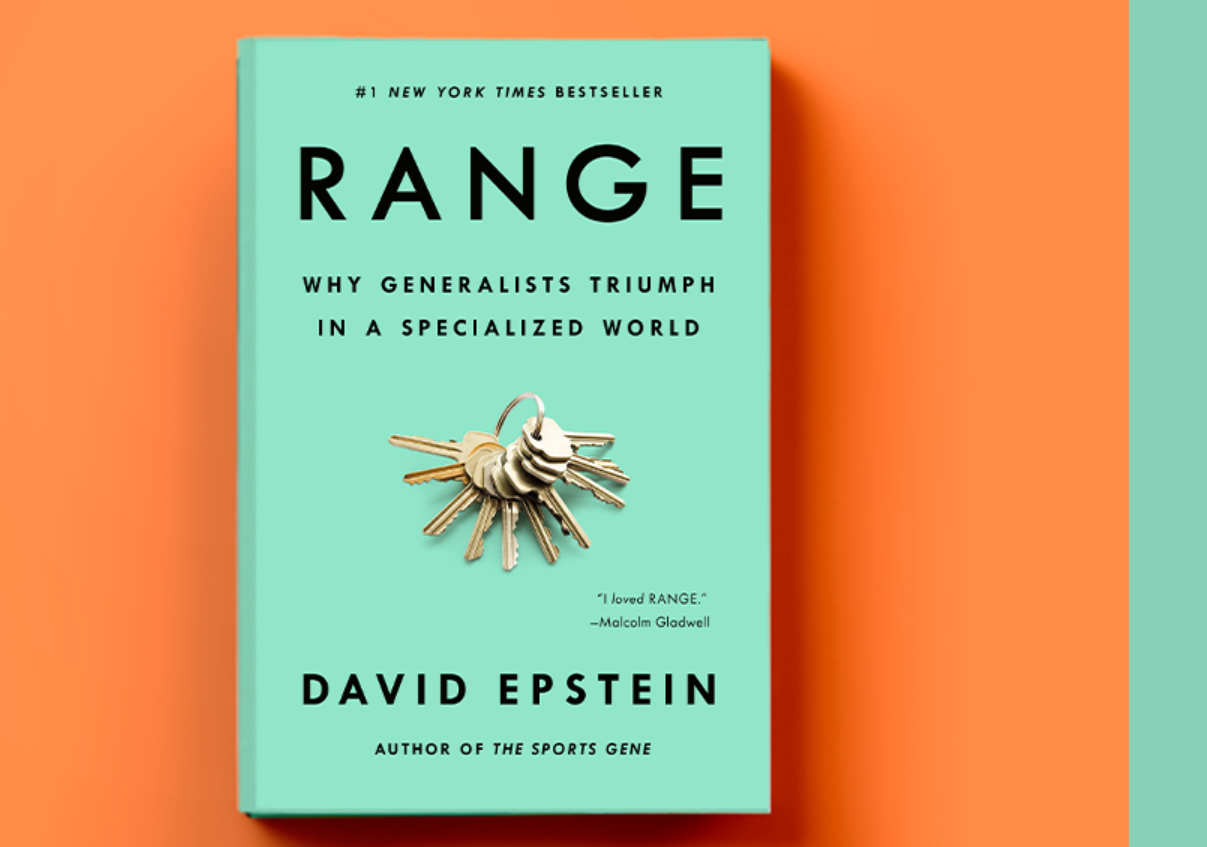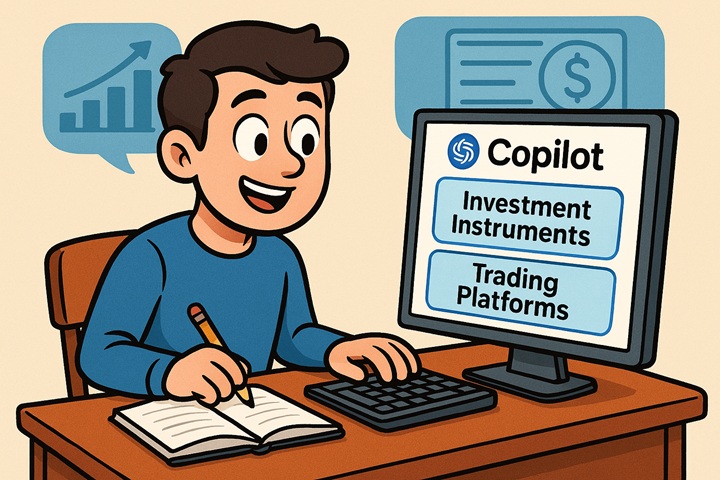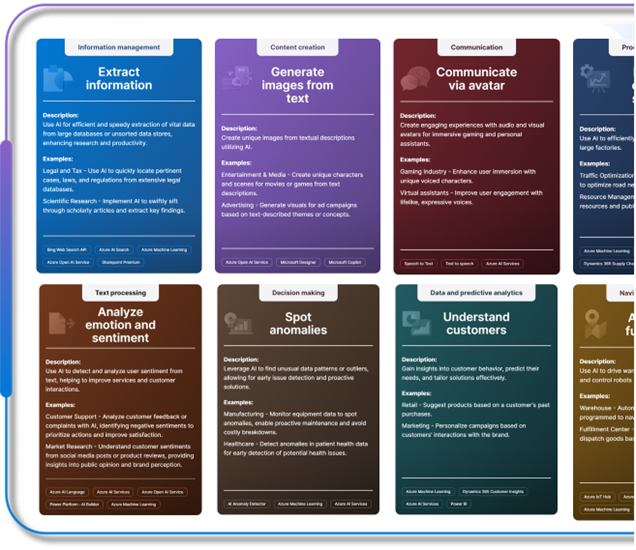Reflections on how embracing range can forge career pathways in the era of AI

Introduction
David Epstein’s Range: Why Generalists Triumph in a Specialized World challenges the conventional wisdom that specialization is the key to success. While prodigies like Tiger Woods set the example of choosing a field early and focusing exclusively and intensely on becoming the best, such success stories are few and far between, and trying to follow the same model can lead to pressuring oneself to pursue specializations before we truly know who we are.
Instead, adopting a “Roger Federer” model, curiously dabbling in multiple fields (in his case, sports) to find where one’s interests and capabilities intersect, can feel like lost time during the exploration phase, but often results in accelerated growth and progress once that fit is realized.
As artificial intelligence becomes increasingly prevalent in our workflows and tools, the book’s insights on embracing breadth, adaptability, and lateral thinking feel more relevant than ever. As a technology professional at Microsoft, I feel empowered to be curious and build technical breadth in addition to my specialized areas, but the core message of Range has encouraged me to take this even further, expanding breadth across domains and considering AI tools both as a competitor against which to re-evaluate my skillsets, as well as an enabler to help me build new ones.
In this post, I reflect on five takeaways from Range, and how they can help modern professionals thrive as generalists in an AI-accelerated world.
Takeaway 1: AI can be a competent specialist in a kind environment, but human ingenuity is essential in broad, wicked domains

Epstein argues that in complex, unpredictable environments (“wicked domains”), generalists outperform specialists. Drawing on examples from sports, science, and business, he shows that those who sample widely, cultivate diverse experiences, and connect ideas across genres are better equipped to solve novel problems.
In this regard, we can consider AI as a hyper-specialist, excelling at learning in “kind” environments with clear rules, feedback, and outcomes (like chess or Go). However, its tendencies to hallucinate and be confidently ignorant mean that it still struggles in wicked domains, where problems are ambiguous and solutions require creativity.
This represents an opportunity for people to expand the scope of issues they address, using AI as an agent to competently manage kind problems while tackling broader issues and systems. A good example of this is how teams can use AI programming tools to build unit tests on discrete pieces of code, allowing them to focus attention on deploying the app environment as a whole.
Takeaway 2: AI is getting better at wicked problems; we must expand the domain

That said, AI is advancing rapidly, encroaching on tasks once thought to require human intuition. Two such examples of this are the Researcher and Analyst agents in Microsoft 365 Copilot, which can analyze vast amounts of information and data to produce insights and strategies that cover several fields. While there is still a risk of hallucination in ambiguous scenarios, Analyst and Researcher highlight the pace of growth in this field.
However, as AI becomes more capable, this means that the boundaries of wicked domains shift. By challenging ourselves to expand our range even further, professionals can elevate their executive thinking to areas where human judgment, empathy, and creativity are still indispensable. This requires a curiosity + growth mindset, as well as allowing ourselves to have greater sampling periods.
Takeaway 3: Sampling is essential to growth, and AI aids in exploration

Embracing “sampling periods”, allowing ourselves time to try totally new things before settling on a path, resonates in the AI era. In fact, AI assistants like Copilot can be powerful guides when quickly exploring new fields where a coach would previously be needed, lowering the barrier to entry in that specific domain. In this case, AI becomes a partner in exploration, not just a competitor.
One way I’ve used AI to practice sampling is in the field of finance. I recently set a goal for myself to build a diversified investment portfolio, and Copilot has been my coach in learning about investment instruments, evaluating individual companies for stock growth, and comparing funds to limit overlaps. As my strategy becomes more solid, I plan to use my new skills and Copilot to branch out to a related area, like alternative investments or learning how private equity works. In the future, I hope to apply this knowledge to my work, maybe by better engaging a customer whose business is in investments.
Being a “deliberate amateur” and staying curious is what allows me to pivot when opportunities arise, as well as create opportunities of my own.
Takeaway 4: Lateral thinking enables practical innovation amidst unprecedented tech advancement

Generalists excel at lateral thinking, connecting ideas across domains to spark innovation. Epstein cites examples like Nintendo’s Gunpei Yokoi, who leveraged “lateral thinking with withered technology” to create breakthrough products.
As the pace of AI innovation reaches staggering speeds, it can be tempting to want to play with the newest toys, marveling in their capabilities without having a practical application in mind; this approach can look great in a manager’s meeting to show off a team’s innovative mindset, but more often than not results in a new addition to the AI Graveyard.
One approach we are taking to address this at Microsoft is AI Discovery Cards, a workshop that challenges businesses to apply design thinking techniques towards their organization’s inefficiencies and opportunities before jumping to a technology solution. Once a process has been mapped, a set of flashcards describing AI capabilities are placed to imagine how current (and by some standards, outdated) tools can be pieced together to solve a larger problem.
By cultivating a diverse group of perspectives to thoroughly examine a problem before posing a solution, we can achieve better long-term results and impact.
Takeaway 5: Learn to Drop Familiar Tools to truly embrace the AI era

One of the most interesting cognitive challenges referenced in Range was the inability of professionals to “drop their tools”. In extreme scenarios, this unconscious self-limitation had dire consequences, where wilderness firefighters lost their lives because they could not let go of their equipment, which slowed them down.
While the situations we encounter in our work are rarely as high-stakes as that of a firefighter, adaptability and re-learning a new set of tools are still key strengths to having success at work. Generalists are comfortable with ambiguity and should be willing to unlearn and relearn as needed, letting go of expertise and embracing uncertainty.
A common quote you will see on LinkedIn or Forbes articles is “AI Won’t Replace you. A Human Using AI Will.”, and I think this captures what can happen to us when we don’t “drop our tools”. It’s unclear what the future of work will look like for knowledge workers, but in a time where new breakthroughs are being made weekly that can affect any domain, the opportunity is there for us to expand our breadth of domain knowledge and find one that can be our next big step.
Conclusion
Range offers a compelling case for embracing breadth, curiosity, and adaptability—qualities that are increasingly vital as AI transforms work and learning. By cultivating range, you can forge a resilient, innovative career path and thrive as a generalist in a world where change is the only constant.
If you’d like to read Range, you can visit https://davidepstein.com/range/ or borrow a copy from your local library!
Thanks for reading, and Happy Building!
